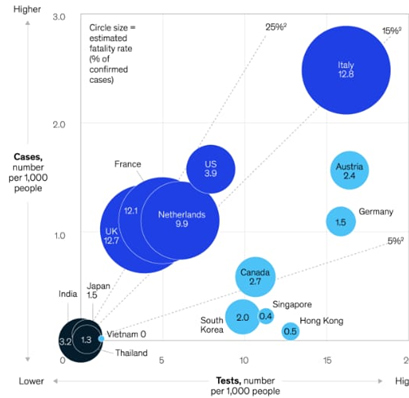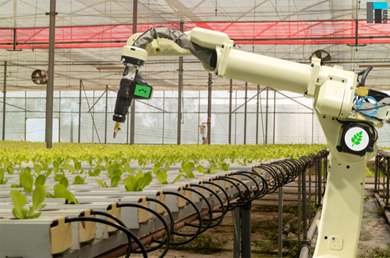Student members: Anwesha Bose (Biotechnology, 3rd year. Adamas University), Soumyajit Chandra (Biotechnology, 3rd year, Adamas University)
The sudden outbreak of highly contagious COVID 19 has led humanity at stake. The high infectivity of the virus combined with high mutation rates has been the greatest hurdle for the scientific societies to discover a potent vaccine or drug for cure which makes the situation even more alarming. Many countries have declared lockdown to ensure safety to the citizens including the developing countries of the 3rd world. But the post-pandemic situations will face a huge downfall in aspects of economy, agriculture, and industries. Situations may turn out to be even worse if the lockdown conditions continue for more months leading to the death of millions of people due to hunger and poverty. The biggest crisis will be faced by the poorer sections. Here a question arises, are we going to face famine shortly? We need to think of strategies to fight back the most undesirable consequences of this pandemic to save humanity from the danger of extinction. Artificial Intelligence can be an ideal solution for both keeping the agricultural productions unaffected along with ensuring minimal usage of manpower to ensure the social distancing and health security of the farmers.
The worldwide problem in open-field agriculture under lockdown condition: The current worldwide pandemic of COVID 19 is spreading at a rapid pace and have affected more than 200 countries worldwide killing more than 2.5 lakhs of people with more than a million people affected till date, since January 2020, when WHO declared it a global health emergency [reference: WHO situation reports]. Neither an absolute cure drug nor a vaccine has yet been developed to cure or prevent the disease which has led the affected countries to declare ‘Lockdown’ to ensure social distancing and to avoid mass infection. This bold step is quite appreciable but it has led to the serious downfall of the economy, agriculture, industry, and raised a question of food crisis to arise in the near future. Although at many places, agricultural activities are allowed that also raises a significant question of the health security of the farmers working in the fields

Representation of Different country-specific data of mortality rate with regards to number of COVID 19 cases per capita
Image source: https://www.mckinsey.com/business-functions/risk/our-insights/covid-19-implications-for-business
Artificial Intelligence a new arena for continuing food production during lockdown condition:
Using an integrated approach of Artificial Intelligence in the field of Agriculture, popularly known as smart agriculture applied to conventional production systems as a solution to fight back the probable consequences of the pandemic as an alternative to manpower especially under lockdown condition where maintaining social distance is a prerequisite. We need automated systems for agricultural purposes to avoid probable food crisis in future and also ensure safety to the workers in the fields.
Putative solutions for overcoming this terrific medical emergency
We can think of a large scale semi-automated hydroponics set up as an alternative to conventional farming, which will require a lesser quantity of manpower and will be cost-effective. The setup will comprise of the following arrangements.
1) A dome-shaped greenhouse chamber (to avoid cleaning of dust particle from greenhouse surface which restricts sunlight)
2) A nutrient solution reservoir tank connected to the cultivation chamber through an automated electric valve.
3) Another valve to eliminate wastewater from the cultivation chamber.
4) DIY sensor-based monitoring of growth conditions, such as ambient temperature, water temperature; pH, Electrical conductivity, humidity and light availability and these can be controlled through mobile application.
5) Water Sprinklers can be introduced to maintain the temperature.

Diagrammatic representation of the probable setup for large-scale automated hydroponics
The proposed system can be used as an automated platform of large scale vaccine production using plant expression system. This will potentially help to combat the sudden surge of demand for COVID 19 vaccine as soon as it is developed. The system being semi-automated, it will use very little manpower and that also for planting and harvesting crops. As the system is planned to be developed in a very cost-effective way topped with extra advantages for using plants as a vaccine production system makes it available and affordable to even the poorer sections. These systems should be made much more available to the 3rd world countries as they are facing the largest crisis in terms of economy, health, and industry.

Image source: Google images, search keyword: Artificial Intelligence for Environment
Prospect of Adamas University using as experimental platform for initiating such need based approach:
Here in Adamas University we have a unique chance of developing such unique ideas along with their implementation and establishing an entrepreneurial setup as here all the schools including school of life sciences and biotechnology, school of engineering and technology, school of law and justice, school of pharmaceutical technology, school of science, school of economics and commerce, school of social sciences, etc. are interconnected through knowledge fibers. Here we learn by exchanging and implementing our knowledge with each other with the guidance of our eminent and efficient faculties. Although now we are locked down in our respective homes we are working our brains out to think of ideas that can make the world live a healthy life with incomparable guidance and support from our teachers and mentors and we promise that we will make the world a better place to live.
Visited 2167 times, 2 Visits today



